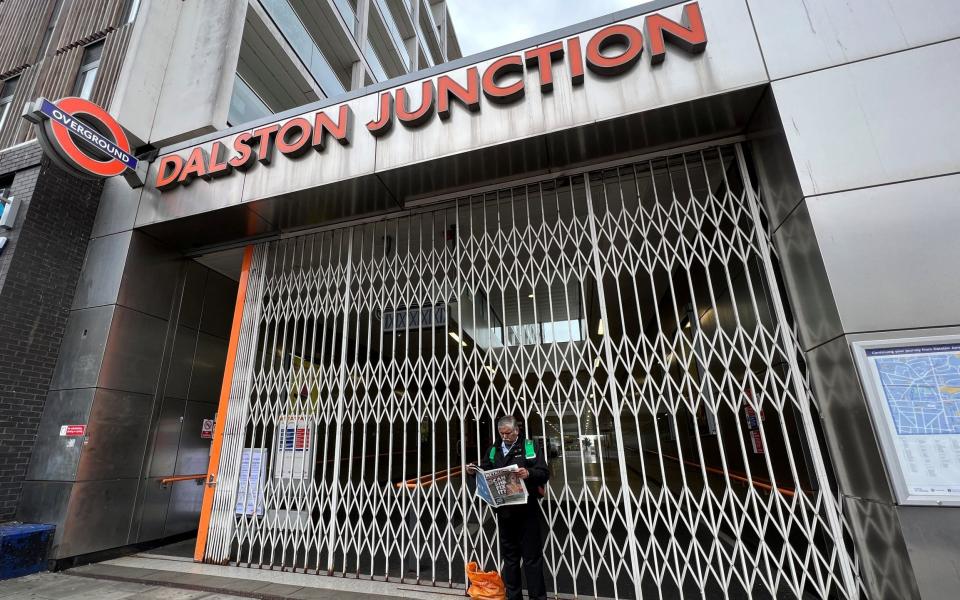Train strikes: February and March dates and the rail services affected

Commuters have breathed a sigh of relief after the RMT union called off strikes due to take place this week after a pay offer was improved.
More than 300 London Overground workers had been due to take industrial action which includes strikes and action short of strike.
However, the dates of future strikes remain in place until workers vote on the new offer this week.
Here is everything you need to know about the upcoming industrial action.
When are the train strikes?
Aslef union members staged industrial action over five days between Tuesday, January 30 and Monday, February 5 – and banned overtime for nine days from January 29. In all, 16 train operators were affected.
RMT union members on the London Overground have now called off industrial action on February 19 and 20 but have left in place strikes due to take place in March for now.
Monday, February 19: London Overground - suspended
Tuesday, February 20: London Overground - suspended
Monday, March 4: London Overground
Tuesday, March 5: London Overground
Will there be more national train strikes?
Train drivers at Aslef have voted to continue taking strike action for another six months in their long-running dispute over pay and conditions.
It is in dispute with 16 train operating companies: Avanti West Coast; Chiltern Railways; c2c; CrossCountry; East Midlands Railway; Greater Anglia; GTR Great Northern Thameslink; Great Western Railway; Island Line; LNER; Northern Trains; Southeastern; Southern/Gatwick Express; South Western Railway main line; SWR depot drivers; TransPennine Trains; and West Midlands Trains.
The union has live mandates for industrial action until August at all of the train operating companies with whom it is in dispute – meaning commuters will have the threat of strikes hanging over them until then unless a deal is reached.
In a separate dispute to the national pay row, train drivers on Northern and LNER are to stage a one-day strike and ban overtime for three days.
Members of Aslef at the two operators will walk out on Friday, March 1 and will take action short of a strike from Thursday, February 29 to Saturday, March 2.
The union says agreements are not being followed.
Strikes have also been held since June 2022 by members of the Rail, Maritime and Transport (RMT) union. However, in December they voted overwhelmingly to accept a deal to end their long-running dispute over pay and conditions. The deal will see the union suspend industrial action until at least April 2024 in exchange for a backdated pay offer which put all members in line to receive a lump sum Christmas payment of at least £1,750.
What about minimum service levels?
A bill for minimum standards for passenger rail services, ambulance services and fire and rescue services was passed in July, to ensure essential services remain in place. It means employers will be able to dismiss staff who refuse to turn up to work when ordered to, while unions failing to meet minimum levels could face legal action.
However, Aslef has reacted to this by warning such legislation could worsen any industrial action.
Mr Whelan said: “Having seen, since this dispute started in June 2022, the resolve of our members, and the support train drivers enjoy among our passengers and the public, the Tories have now tried their old trick of changing the rules.
“When they couldn’t bully us into backing down they brought in minimum service levels – designed, effectively, to ban strikes by making them ineffective – but this new law won’t ease industrial strife. It will just make it worse.”
Advice for travelling during train strikes
Transport for London recommends that passengers use its Status Updates tool before travelling and to check for alternative routes.

Are Aslef close to a deal?
Aslef general secretary Mick Whelan has been dismissive of the chances of a deal.
He has repeatedly refused to put an offer made last April to members, calling the offer of a 4pc pay increase “ridiculous”.
He said: “Since then our members have voted, time and again, for strikes. That’s why Mark Harper, the Transport Secretary, is being disingenuous when he says that offer should have been put to members.
“Drivers obviously wouldn’t vote for industrial action, again and again and again, if they thought that was a good offer. They don’t. That offer was dead in the water in April last year – and I think Mr Harper knows that.
“But we remain open and willing, as ever, to talk about a revised offer. That’s why we are asking the Secretary of State for Transport, or the Rail Minister Huw Merriman, to come and meet us. Mr Harper hasn’t seen fit to talk to us since December 2022; Mr Merriman has not been in the room with us since January 2023; and the RDG has not talked to us since April last year.
“Today we are saying, clearly, to Mr Harper, Mr Merriman, the RDG and the TOCs, come and talk to us. Let’s sit around the table and negotiate. You don’t want any more strikes, and we do not want to be forced to take any more industrial action, although we have the renewed mandates to do just that.
“We want to find a resolution to this dispute, for members who have not had a pay rise since our last deals ran out in 2019, and the only way to resolve this dispute is for the employers, and the government that stands behind them, to come and talk to us.
“That’s why I’m saying the ball is in your court. We are ready to talk. Are you?”

 Yahoo Finance
Yahoo Finance 